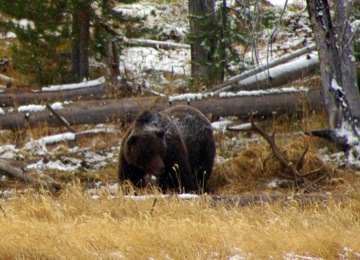More grizzlies than thought in the Northern Continental Divide Ecosystem

The grizzly bear DNA study that Senator John McCain often ridiculed out of ignorance has shown that there are many more grizzly bears in the Northern Continental Divide Ecosystem than previously estimated. The technique is effective enough that individual bears can be recognized and the parentage of the bears can also be determined.
The researchers estimate that there are about 765 grizzlies in the area which is 2 1/2 times higher than previously thought.
Industry groups like this information because they want grizzlies to be taken off the Endangered Species List. They are hoping for eased restrictions on logging, mining and other activities.
Hair rub technique appears to yield cheaper, more accurate data on grizzlies.
Juliet Eilperin – Washington Post

Comments
Cody G&F warns in the Cody Enterprise that dry conditions this year will be bad for bears. Snowpack here is 68% of normal and of course, the white bark pine trees probably won’t be as productive as last year. So, yeah, let’s delist the bear since they are having such an easy time surviving in these drought years.
Quick-and-dirty question (I promise to read the whole article later): How do they know the hair is fresh? In other words, doesn’t hair persist, potentially over a span of years, such that the animal that left it could be deceased? In other words, how do they validate that they have identified the hair of a living (or likely living) animal?
VC, b.c the animal actually walks up and rubs on the hair and I imagine they just calculate each estimate for a given year…
V.C., they usually put a strand of barbed wire and some smell out to attract bears, then they remove the setup when the study is done. This way they are getting hair left only during the study period.
I worked with Kate on part of her study, we placed the hair snag for a specific period of time, collected the hair, and removed the snag, so we prevented what your describing..
Thanks very much, everyone, for the information on bear hair collection technique!